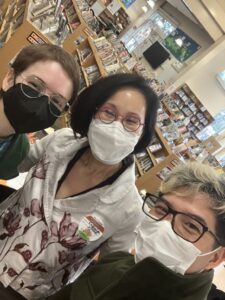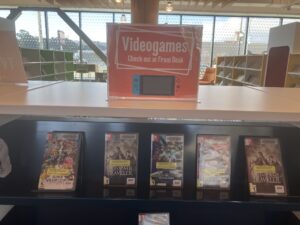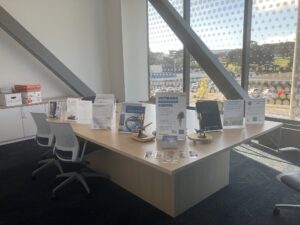By Ray Pun (IFLA CPDWL Advisor and IFLA SocSci Libraries Member), Loida Garcia-Febo (IFLA CPDWL Advisor and IFLA M&M Chair), Robin Kear (IFLA SocSci Libraries Member), and select Library Juice Academy Students: Sara Huesman, Calantha Tillotson, Sherri Machlin, Lily De La Fuente, Steve Campas, Amanda Hovey, Amanda Whitmire, Jeanine Bell, Vashalice Kaaba, Melanie Janelle LaGasse Valle, Nelson Febo, Mark Mattson, Amy Allen, Karen Adjei, Alex Scarelli-Smith, Megdelawit Abebe, Sara Orcutt, Kate Pham, Cyan McMilan

Source: Unsplash – an image from outer space of the world with lights and connections from NASA
Throughout the month of March 2024, Ray Pun, Loida Garcia-Febo, and Robin Kear co-taught an asynchronous online professional development course called “Introduction to Global Librarianship hosted by Library Juice Academy (LJA), a program focused on providing “online professional development courses for librarians, archivists, and other staff.”
This was our first time teaching this class for LJA and we learned a lot from the process and engaging with 29 students from all over the world: Australia, United States, Canada, etc, working in different types of libraries like public, museum, special, school, academic (research and community college libraries), health sciences, marine sciences, etc – in different roles such as a library workers, director, PhD student, MLS student, etc. It was an opportunity to build a community interested in global librarianship and share best practices with each other on this topic. The purpose of this class was the following:
- Learn about different global librarianship programs; and the issues and trends impacting libraries globally
- Learn about benefits/challenges of different global programs and opportunities including international library associations, studying/working abroad and research fellowships
- Create and build self-guided tips, recommendations, strategies and resources related to these professional opportunities in global librarianship
We curated a list of readings, webinars, and podcasts (including CPDWL’s Podcast Project), created weekly short video discussions on a variety of topics for the week and requested students to participate in discussion boards or short reflections about their experiences in global librarianship or on information research gathering of where they would like to work or what kind of global project they would like to work on. We also held virtual office hours and conducted pulse checks to hear from students on zoom live or to receive feedback anonymously. Students also contributed professional development resources related to global librarianship interest. You can find the working list here.
What we learned was that not everyone has worked/studied abroad nor do they want to – some are keenly interested in collaborative global library projects whether that is forming partnerships via sister libraries or data sharing programs. It was such an eclectic group of students with deep expertise in so many areas. Some shared about learning and maintaining different languages where they would like to work and others talked about the challenges in working abroad from past experiences. It was a wonderful opportunity to reflect on the importance of global librarianship in our work across our cultural differences and appreciate such differences and similarities. In this blog post, we showcase what our students learned and reflected on. We want to thank students for being part of this learning community and for sharing thoughtful pieces!
Sara Huesman:
While I took away a lot from this course and learned things about international library associations that I was not aware of, I think a big takeaway is that many librarians do not get the chance to participate in international conferences or even large conferences that take place in their home countries. This is a large hurdle even in my own public library system as well. While we are able to send several employees each year to local state conferences, usually the national conferences are too cost prohibitive to send more than a couple of employees to. For example PLA is next week in Columbus, OH and we were only able to pay for about four members from our 250 employees. I know many in the system are paying their own way since this is a national conference that doesn’t need airfare as well. While I understand that conferences are very expensive to host, price tags of 400-500 dollars to attend a three day national conference is out of reach for many library systems and certainly out of reach for everyday librarians. Even paying over 300 dollars to watch the virtual option is a lot for public libraries to pay for. As librarians we need to continue to advocate for ourselves to our library boards or city governments to make continued education a priority for our staff with additional funding, but we also should take a look at the prohibitive cost of conferences in general.
Another hurdle that I see for librarians in the US is opportunities to work/study in other countries and experience the differences between US libraries and libraries in other countries. I was very lucky to have the opportunity to do this during my master’s degree but again it was only an option due to scholarships and the flexibility of my job at that time. Within my own library system, many staff have asked about working abroad for a short time or even trading library employees in other countries for a short amount of time. They were met with the option of resigning from their position in our system and hoped there would be a job available for them when they returned but it was not guaranteed. Again we need to advocate with both our administrations and library boards to make this an accessible option for library professionals and also allow them to have job security while they are abroad. If we are going to change the face of libraries for the better in the future, we need this essential training on a global scale, not just in our own country.
Calantha Tillotson:
- I chose to attend this course for two main reasons. First, the responsibilities of my current position include supporting the School of Information Sciences (SIS) as their subject expert librarian, and I realized international librarianship was a gap in my knowledge base, after fielding several questions from graduate students interested in pursuing professional positions outside the U.S. The stories and resources shared were especially advantageous in shoring up this hold in my expertise. I plan to share this garnered knowledge with the Masters in Information Sciences (MSIS) students through the following avenues. Primarily, I plan to integrate a few of the most impactful media and manuscripts from the course to the research guide I maintain. For example, the IFLA Journal, IFLA Podcast, and Taking your MLIS Abroad: Getting and Succeeding in an International Library Job book will all be especially applicable to students in the program. I also conduct a semesterly student-led, discussion-based event with MSIS students on areas of concern or interest for those entering the profession post-graduation. If the student leaders agree, I will work to recruit a librarian who can speak on their experiences with international work and field questions from interested students.
- Second, as a mid-career librarian, I realized I had yet to experience international librarianship, and I found myself increasingly interested in adding such exposure to my repertoire. Having also never traveled outside of the U.S., long-term or permanent global work feels inadvisable at this point. I appreciate the panel from the ACRL Taking Your MLS Abroad Webinar Recording for bringing such barriers to my attention. Especially after learning I would have to leave my dogs behind and hearing of librarians who had to back out of their contracts due to difficulties with adapting, I must acknowledge my limits. While I am leaning heavily towards attendance and presenting at an international conference as a first foray, I also find short-term research (like Fulbright), visiting professorships, or exchange programs to be strong possibilities. I look forward to any and all experiences that come my way!
Sherri Machlin:
Many thanks Loida, Ray and Robin for facilitating this excellent Library Juice Academy professional development course. For me, it really felt like the right course at the right time, and breathed some life and renewed energy into my chosen field, expanding my interest in professional development from a mid-late stage career perspective. Having worked in a large, urban public library system now for nearly two decades, I am excited to think about the possibilities of extending and interacting with areas of the profession outside the library walls, and possibly even the country. The tools, recordings and message board interactions have definitely broadened my perspective.
In the article “Librarians’ Attitudes, Needs, and Barriers to Participating in International Conferences: A Survey of ALA Members,” Liu, Frank, Dawson and Olaniyi reference James Thull, who states benefits such as “professional rejuvenation, networking opportunities, dissemination of information, and the ability to see new perspectives on librarianship” as appealing factors in international conference attendance. He further stressed that “the exposure, learning, and networking that can occur can be life changing and help put our career choice into perspective in terms of its value not only to the patrons we serve directly but to patrons the world over.” This really resonated, and inspired me to join IFLA’s information literacy committee. The article also notes that lack of institutional funding was the most significant barrier to attendance, especially in public libraries, which I can attest to for sure. Nevertheless, with post-pandemic normalizing of virtual conference attendance, this barrier to travel can be reduced and create opportunities to interact and create partnerships with librarians and institutions regardless of geographic location. “Libraries for Peace” is definitely something I would also like to look more deeply into as well. I think libraries are the perfect place to create networks of care and knowledge to actively contribute to more peaceful, democratic societies.
Lily De La Fuente:
When I signed up for this class I didn’t realize the breadth of backgrounds that would be coming together due to our shared interest in global librarianship. Colleagues came to the class to learn about how libraries and archives function outside the US, discover new opportunities for short-term and long-term work abroad, learn about international collaborations, and take us all on nostalgic trips to different parts of the world by discussing their experiences. People had studied, interned, or worked abroad in places like Cambridge (England), Paris (France), Vietnam, Cape Town (South Africa), Granda (Spain), Uganda, Canada, Ascoli Piceno (Italy), Kyoto (Japan), Sydney (Australia), and Frankfurt (Germany). Some people came with plans to relocate or find work in Addis Ababa (Ethiopia), Japan, Taiwan, Ireland, Italy, France, Mexico, and Ghana. I came to this class with a vague idea of plans for the future, but departed inspired to pursue various opportunities.
Another point that really struck me during this course is the topic of wellness and investing in yourself. Throughout my career as a librarian I’ve invested a lot of time curating multicultural displays, event programming, and book clubs. I’m proud to serve as liaison to most of the foreign language departments, welcome the visiting Language Scholars, and lead orientation outreach to International Student Services. Slowly throughout the course I grasped that in the same way I nourish and try to widen global experiences for patrons, I need to do so for my own professional development too. There are many ways to get involved and one organization that resonated with me was IFLA. I was recently informed my submission for the MCULPT Mini-Conference hosted by IFLA Library Services to Multicultural Populations was accepted. I look forward to widening my own global network in the coming months and joining like-minded groups.
Finally, rather than limiting myself to a certain geographic area I think I’ve come away inspired to pursue opportunities in areas where I may have thought I wouldn’t be able to make as much of an impact. I have a need to travel and meet information professionals from around the world and learn about libraries. I can’t be the only librarian that always has to stop at a local library when I visit a new country, right? Rather than start from scratch, the course has taught me the importance of leveraging my global experiences in my career. It has been refreshing to explore international opportunities with colleagues from around the world, learn about the role of libraries in geopolitics and involvement in forums like the UN, and come away with a wealth of resources to make a realistic entry into global librarianship. Thanks to my wonderful peers and the wisdom of Robin, Ray, and Loida I think I feel knowledgeable enough to confidently take the first few steps into this flourishing international network and field.
Steve Campas:
The main reason I took this course was to gain more information on working abroad as a librarian and the issues that may arise with this possible career choice. I am always looking for opportunities to develop and expand my professional learning experience and this class gave me insight on the different paths that I may explore when it comes to fulfilling that goal.
My initial introduction into library work started in 2020, right before the impact of Covid and how it changed the world. I could see how it altered the day-to-day operations and how the library would normally operate. Different roles and responsibilities were taken up by departments that customarily would not be responsible for them. The library came together to work as one unit, adjusting to the demand and need for resources and information. We had to change the way these resources were to be made available to our community. The issues that we, as a small community library faced then, still face the global library community today, mainly trying to ensure that communities have and maintain access to vital resources and programs.
My work in the Peace Corps showed me the delicate process of being introduced and living in a different culture and the impact it has on my own ideas of culture and way of life. The goal of a community wanting to preserve its past for the future is one that has piqued my interest in the field of preservation and archival work. Robin mentioned she hoped this class showed how global issues can impact us as individuals and how we can address those issues through possible specialty areas of library concentration.
This class was in a way, a humbling experience, because even though I feel I am well-traveled and have lived in another country, the personal stories, experiences, and unexpected challenges I heard from others, made me realize, again, how vast a difference it is from visiting, to live and and more importantly, thrive in a different culture.
Amanda Hovey:
On reflection, the LJA course has broadened my mind and sparked new ideas of what Global Librarianship means to me. I’ve learned from the presenters and the course resources but also benefited from connecting with library colleagues with different backgrounds and perspectives. I feel motivated and inspired to contribute to the world of libraries beyond those in my local community.
Being able to complete this course online has given me a different global perspective I could not have experienced within Australia. While Australia boasts a well-developed library system, we can sometimes feel isolated from developments from the rest of the world, particularly the Northern Hemisphere. Even something like the Library Juice Academy is not something we have in Australia.
The “library map of the world” was a resource I discovered and inspired me the most. It sparked my desire to create other maps which visualize library data from across the globe. This aligns perfectly with my new skills in data analysis and story-telling and the work I have been doing displaying electorate data in my State.
The course resonated with my interest and belief in information equity. The UN Sustainable Development Goals (SDGs) provides a powerful framework to guide these efforts. This experience sparked a newfound interest in international policy, particularly how libraries everywhere can contribute to achieving goals set by organizations like the UN.
While I am enthusiastic and excited about the prospect of working abroad, I appreciate it will come with a set of challenges. The reality of working in Europe or a foreign country is different from traveling and presents additional logistical and financial hurdles. In the meantime, I will think of ways I can contribute from home.
For now, continuing my learning and building strong networks will be central to my professional development in global librarianship. Resources from the UN, IFLA, ALIA, and ALA will be useful for staying abreast of international trends. I’ll actively seek out networking opportunities, both online and in-person, to connect with colleagues and explore new possibilities.
Looking forward, I believe library associations worldwide should prioritize collaboration, sustainability, and inclusivity. By fostering strong partnerships with organizations like the UN, we can amplify our impact and empower vulnerable populations like people living in poverty, indigenous communities, children and women on a global scale.
Overall, Global Librarianship offers many advantages and opportunities. We are now able to take advantage of technological advancements making collaboration easier than ever before. This course has instilled a deep appreciation for the interconnectedness of libraries – truly, a world without borders.
Amanda Whitmire:
I approach pursuing international librarianship through the lens of being a relatively narrowly focused liaison librarian in the marine sciences. How can international collaboration improve my praxis in academic librarianship? As the international community works toward creating better frameworks for connecting ocean science with the needs of society – through the Sustainable Development Goals (SDGs), for example – what is my role as an information professional in democratizing the creation of, and access to, aquatic knowledge?
In building collections at our marine field station branch library, I’ve moved towards a curatorial approach that reframes library collections as data. Research in oceanography and marine biodiversity inherently extends beyond geopolitical borders. It feels natural to make connections between computationally accessible library collections and open knowledge bases like WikiData and the Global Biodiversity Information Facility (GIBF). I will continue to explore how I can make more explicit and direct connections with colleagues in other countries as I engage in collections-as-data projects. Where to begin?
Reflecting upon international collaboration, García-Febo and McCleer conclude that, “The most significant success was establishing an international network of individuals, organizations, and institutions interested in improving information access through education in the Dominican Republic” [1]. Perhaps my first step is building an international network that is specific to my interests in activating historical knowledge and data that supports research in understanding the accelerating impacts of climate change on our Earth system. Who among my library and natural history museum colleagues is engaged in similar work? Who may have experience where I am lacking it, and how can I share my knowledge to benefit others?
I find a lot of inspiration from IFLA’s engagement with the Sustainable Development Goals. A huge success of the SDGs is that they make seemingly intractable global challenges into discrete action areas that individuals and communities can engage with. I’m thinking a lot about how I can align my work with their framing around SDG 14: Life Below Water, and SDG 16: Peace, Justice and Strong Institutions. I plan to explore how my colleagues in the International Association of Aquatic and Marine Science Libraries and Information Centers (IAMSLIC) may be leveraging the SDGs in their work.
I’m not sure where these explorations may take me, but this course has been extremely informative and worthwhile. The instructors offered more resources than I could possibly get through in our four week program, but I’m going to keep working through the videos, blog posts, book chapters and more. I am grateful to Ray, Loida and Robin for sharing their experiences and expertise.
[1] Constantinou, Constantia, Michael J. Miller, and Kenneth Schlesinger. International Librarianship. SUNY Press, 2017. https://soar.suny.edu/handle/20.500.12648/8415.
Jeanine Bell:
Throughout the past month, I’ve had the pleasure of discussing global librarianship with an enthusiastic group of like-minded individuals and of accessing a wide variety of invaluable resources. Of course, the problems that libraries face are myriad and ever evolving with the changes in technology and geo-political circumstances, but some challenges remain ever the same. I for one am fascinated by how language creates barriers and opportunities for new understanding. In taking this online course, I’ve been able to grow my resolve to explore the work that goes into translating and adapting materials to make information accessible. While some of the notions of traveling abroad are still daunting, I now have a better understanding of what going abroad entails, what supports are available to me, and that many others have forged a similar path. It has been a great comfort and ignition to start moving forward.
It’s fortunate that our ability to connect and problem solve is also adapting to meet the challenges we face and goals we create as a global community. Online learning and virtual conferencing have been instrumental to my ability to network with professionals that I may have otherwise never crossed paths with. Many careers, not just library ones, put heavy focus on networking in order to grow and access new experiences. I sincerely hope that library associations continue to give space and grace to all different types of library workers in the plethora of subjects they each focus on, regardless of what degree or title they may hold. As someone who may be considered a bit “lower on the food chain,” I am extremely grateful to have been given a platform to discuss and learn and share with incredible people that I truly admire. Armed with new colleagues, resources, and vigor, I look forward to contributing to the global efforts of translation and accessibility work in libraries.
Vashalice Kaaba:
The field of global librarianship is one of constant evolution, necessitating ongoing professional development. My recent engagement in this course, which is dedicated to this field, has enriched my understanding and highlighted the critical aspect of library service accessibility on a global scale.
The role of libraries extends beyond traditional boundaries, raising pivotal questions about equitable access to information. My reflection aims to underscore the importance of universal information access and suggest areas of focus for library associations globally.
The course underlined the importance of viewing library services through a global lens. Information access can dictate societal outcomes, so ensuring equitable access is paramount. This leads to the conclusion that library associations globally should prioritize removing barriers to information access. A primary area of focus is digital inclusion. The digital divide remains a stark reality in many regions, especially in the Global South. To address this, libraries should expand digital collections and provide internet access but also ensure that these services cater to diverse user needs. Such initiatives are instrumental in bridging the gap between technology and accessibility.
Cultural sensitivity in library services is also vital. Libraries need to offer materials that reflect the linguistic and cultural diversity of their communities. This approach nurtures inclusivity and enhances user engagement. Additionally, librarian professional development should emphasize acquiring skills pertinent to managing services in a culturally diverse and technologically advanced environment. Developing both technical skills and cultural awareness is essential for effective service delivery in diverse contexts. Collaborative efforts also play a crucial role in enhancing global library service accessibility. Partnerships among library associations, governmental entities, NGOs, and community organizations can facilitate resource sharing, joint initiatives, and advocacy for policies supporting library accessibility.
This course has reinforced my belief that the future of librarianship hinges on its adaptability and commitment to serving the global community inclusively. It has also further ignited my love for librarianship and my passion to continue my library work overseas in a more meaningful way. We, as librarians, must focus on promoting access to information for all, to the eradication of information access disparities.
Melanie Janelle LaGasse Valle:
Global librarianship is what every professional makes of it. However, in a world that is increasingly more interconnected, along with the impacts of war and climate change displacing families, this knowledge becomes essential in addressing the needs of our evolving local communities. Opportunities in global librarianship also grants information professionals the opportunity to gain exposure to different perspectives in librarianship or, if they so choose to relocate abroad, to represent and share aspects of their own ideas and cultural background in turn. The opportunities themselves are varied in nature. Government or military librarians tend to have opportunities to reside and work abroad up to a specific number of years, promoting and supporting national security studies and multilateral relationships. International school librarians can give students exposure to their mother tongue, culture, and educational background to compliment the students’ own culture of origin. Academic librarians can additionally work, conduct research, or attend conferences abroad to further discourse within the field. Finally, information professionals can reinvent themselves outside of traditional library settings and delve into systems, data science, and involve themselves in providing access, developing systems, and spearheading tech outreach for developing libraries or libraries at home, focused on addressing otherwise underrepresented communities in library spaces.
The sky’s the limit for information professionals. However, in my experience, library schools are still catching up with these opportunities, meaning that promising talent sets out into the field without entirely realizing what their potential in these opportunities could be. Being that developing one’s career in global librarianship tends to take a bit of extra time and effort, courses like this one allow early-career library professionals to think outside the box and intentionally look into international or multicultural opportunities. Ultimately, exchange programs, programs geared towards international school librarianship, along with cultivated internships to collaborate with Indigenous, Black, Hispanic, LGBTQ+, and other special libraries, organizations, and archives, need to be a greater focus at library schools and in professional development opportunities beyond graduation. Global exposure is the reality of our world just as much as advances in technology are.
Nelson Febo:
While reflecting on my professional development journey in the realm of global librarianship, it becomes evident how the digital age has significantly redefined learning and information dissemination. The tech revolution has democratized education, shifting it from a traditional hierarchical model to a more inclusive “everybody to everybody” format. This transition has only made learning more accessible and encouraged a culture of continuous personal and professional growth, a vital attribute in our field of librarianship.
The significance of global librarianship cannot be overstated, especially in the current political climate where libraries find themselves at the center of societal support and cultural preservation. The role of libraries extends beyond being mere repositories of books; they are vibrant community hubs that foster lifelong learning, inclusivity, and open access to information. In this light, the global librarian emerges as a custodian of genuine democracy, ensuring that knowledge, kindness, and respect remain universally accessible. This mission is poignant today, as libraries worldwide strive to navigate the complexities of censorship, digital privacy, and the ever-growing need for information literacy.
This course, despite its brevity, served as a profound spring of knowledge and perspective. The diverse insights offered by the proctors not only enriched my introduction and understanding of Global Librarianship but also highlighted the multifaceted nature of librarianship. This exposure is indispensable, as it equips us to approach our roles with adaptability and empathy, qualities that are essential in a profession that caters to our universal knowledge and culture.
Looking ahead, library associations and professionals must champion the library’s integral role within the community. In an era marked by a sense of isolation and digital overload, libraries stand as homes of connection and serenity. They offer a sanctuary where individuals can find solace in the written word, the warmth of communal learning, and the reassurance of intellectual freedom. As such, librarians must embrace the mantles of advocates, promoting the library not just as a place of learning, but as a vital community resource that nurtures social bonds, fosters inclusivity, and empowers individuals through unfettered access to knowledge.
In the end, the focus of library associations globally should be on reinforcing the library’s societal value, advocating for sustainable funding, and fostering a culture of innovation and inclusivity. By doing so, we can ensure that libraries remain vibrant centers of learning, culture, and community well-being, resilient in the face of the challenges and opportunities that lie ahead in the 21st century and beyond.
Mark Mattson:
It seems that a focus on international/global librarianship appears in cycles within the profession over different time periods and I feel like we are entering a new flourishing of the sub-discipline (the appearance of this course being a prime example). I find it thrilling, and fascinating, to be able to participate in this new wave. As a librarian whose work is focused on international librarianship and global engagement, participating in this online professional development opportunity has allowed me to get a valuable look into what folks within the broader field are thinking about the sub-discipline.
I enjoyed getting an opportunity to see how folks think about the interconnectedness of libraries across borders and the ways that that plays into their career goals. I especially enjoyed the forums in which participants shared their experiences so that all could benefit from their unique perspectives. I thought that was a particularly valuable aspect of the course.
One of the things that I also liked about the way the course played out over the weeks was the way that the importance of cultural competence/humility in librarianship popped up throughout the course and discussions. I think that this aspect or skill set within librarianship is invaluable not only in an international context but for the profession as a whole. An awareness of cultural norms, values, and customs used by populations which our profession is serving is, I feel, one of the most important tools for creating a welcoming, inclusive, and effective atmosphere and services for our communities.
Looking ahead, library associations globally should continue to prioritize collaboration and knowledge-sharing initiatives through programming and shared vision. By fostering partnerships between libraries in different countries, we can leverage each other’s strengths and resources to address common global challenges. Libraries and our associations need to continue to come together with a common purpose to ensure we have a seat at the table and demonstrate our potential for contributions to achieving global goals. We also need to continue to advocate for policies that support libraries and information access as fundamental human rights.
In short, my experience in this professional development course on global librarianship has reinforced my enthusiasm for this work. Kudos to you instructors for making this available!
Amy Allen:
As a person who has always been curious about the world, about people and cultures and ways – distinct to my own, it is only natural that as a librarian, I long to connect with, learn from, and support colleagues living in far away places on this big blue marble floating through space we call home.
The course on Global Librarianship offered through Library Juice Academy has provided a delightful pause for exploration. Normally my daily work does not allow me the privilege of time to wonder, explore, and discover means and ways for dipping my toe back into the giant pond of worldly connections. This course provided me with the perfect excuse to need to make time for this.
I look forward to exploring further the many resources, initiatives, and entities shared and discussed during the course. It is inspiring to me to think about the interwoven networks of library associations across the world. Their combined efforts towards shared focus on the various ways that libraries, librarians, and library associations can help keep humanity supported and inspired is honestly – encouraging. I thank whole-heartedly Ray, Loida, and Robin for their time and efforts given for sharing their knowledge and experiences.
Karen Adjei:
I have really appreciated this introductory course to global librarianship provided through Library Juice Academy. The structure of the course lends itself well to promoting best practices in international librarianship, namely networking and compiling resources to share in support of each other’s work. While the field is broad and we weren’t able to cover everything that could be covered in global librarianship, I felt that the participatory approach, especially in compiling resources as a class, helped to illuminate that this field is dynamic and that we need each other to better see what is happening in the field. In addition, the presence of experienced and influential leaders in the field also serving as our teachers for the course shows the importance of mentorship and paving the way for future generations in defining the values that global librarianship should be anchored by.
I especially appreciated the final module, the Future of Global Librarianship, as well as the reading “Librarians’ Attitudes, Needs, and Barriers to Participating in International Conferences: A Survey of ALA Members” because it showed the current needs of librarians in this niche field, pointing us to possible areas of growth that we can begin to influence. I also appreciated the resource “University of Illinois Urbana-Champaign’s Mortenson Center for International Library Programs” because I feel that this is a great starting place to get involved in international librarianship through a variety of opportunities and engagement modalities in the field from a reputable and trusted institution. Hopefully more library associations will take note of such needs and resources, and use them as models to better serve library workers around the world. One thing that I will take away from this course, which was also mentioned in the video, “Library Services to Indigenous Populations Worldwide: Rebuilding Trust and Reigniting Global Solidarity”, is that there is no one-size-fits-all approach to global librarianship. I feel that even the term global librarianship, within the field, is a misnomer as to its specificity and even the notion of subject specialization within librarianship as a whole.
Rather, I feel that global librarianship truly points to the fact that librarianship is happening everywhere across the globe, and while each individual can and must define what that looks like for them within their own context, goals, and community, we must ultimately support each other on this journey. As for myself, I am excited to explore what global librarianship will look like through the lens of theological librarianship in Asia.
Alex Scarelli-Smith:
I think library associations globally should be focused on providing unfettered access to information to all users. I think, too, that library association should continue to be attuned to efforts to restrict or deny access to people. While my work is focused on ensuring access for students in a public high school setting, I believe this needs to be a global effort, especially in places where free speech is valued historically. Along with continued funding of libraries and school librarians, my state organization continues to be focused on battling censorship, book challenges, and attempts to restrict patrons’ access to material.
In addition to this, I think global librarianship should continue to focus on building connections. One of the most valuable things I learned in this course is about IRRT’s Sister Library program. This appears to be an established program that can help introduce me and my students to other libraries in the world. It will be good for me to stay abreast of current trends and opportunities for connection through the publications shared in this course.
Course Reflection
I wish this course ran a bit longer. I feel like I’ve only just begun to dive into some of the resources that were shared throughout the course. I will save the resources so that I can return them and spend more time learning about global librarianship.
I found it most helpful to learn about travel abroad opportunities that may be available to me in the future. School librarian positions are coveted in many towns and cities in my state because there’s sometimes only one librarian per school, as is the case with my school, and once someone leaves their job, there’s an unlikely chance that position will ever be open again once filled. Thus, when exploring opportunities abroad, I’m looking for temporary professional development opportunities or summer work assignments.
Megdelawit Abebe:
This course has introduced me to the international librarianship community in ways I did not expect. Prior to enrolling, I had a vague idea of what international librarianship could be. Now, I have a narrower framework to pull from that has led me into interesting directions.
Professionally, I can see the connections between my work in the USA and the global community – especially with emphasis on open educational resources. I did not realize that before, so in a way, I feel more connected to librarians abroad already.
Because of this class, I joined the IFLA with plans to participate in the new professionals special interest group. I have also reached out to the Mortensen Center about potential internships. Though I am not entirely sure what my international career may look like at this stage, I feel more confident about the spaces I should be in to actualize my goals.
My interest is in Ethiopia (so far from what I gather) it appears that the international library community emphasizes open access to educational resources, digital equity, internet governance and children’s literacy for this particular region. I think these are all worthy causes to be invested in – though I would like to see more on the connections between dis/misinformation networks and war, especially as its segments through ethno-religious identities. I am curious about librarians’ role in making historically accurate information accessible within a region that has struggled with countless regime changes, all of which has had effects on public memory and interpretations on history.
There are many challenges and opportunities in Ethiopia which relate to libraries, and I feel closer to identifying what those are, as well as what I could do to participate in the solutions.
Sara Orcutt:
My initial idea of Global Librarianship was that it was more focused on the act of traveling internationally to pursue and perform library and archives work. I considered it more of an act of sharing your experience or skills with another library or archive in the pursuit of gaining experience both professionally and personally. I did not consider the idea of Global Librarianship as an act of interconnecting and collaborating with other library professionals on an international level. What this course has taught me is how much collaboration drives Global Librarianship and how important it is to get involved in associations like ALA and IFLA and others and to join committees and roundtables to collaborate and connect with other professionals.
Professional development has always been something I’ve considered to be important for the library and archives profession. Currently I am pursuing the Archives Administration and Management certificate through Library Juice and the American Library Association as well as the Arrangement and Description (A&D) and the Digital Archives Specialist (DAS) certificate programs through the Society of American Archivists. Some of the courses for the SAA certificate programs are offered both online and in-person. The in-person courses have given me the opportunity to travel to a few libraries and archives state-side which has allowed me to connect with other professionals in the industry and it has been a wonderful experience. I hope this is a stepping stone to pursue professional development courses as well as work on a global level.
I think library associations globally would benefit from being involved with IFLA and following the association’s mission, vision, and core values. Learning about IFLA and the United Nation’s RDG plans has been very informative on policies that I think all libraries consider to be valuable and important to serving their communities. I also reflect on the article from the readings in the final week that discussed the survey of ALA members. I agree that there should be more funding available to support library and archive workers who want to pursue global opportunities for work and professional development.
I am grateful to you all, Ray, Loida, and Robin, for hosting this course and teaching me about Global Librarianship! There have been times where I have felt alone in the pursuit of learning and working in the profession abroad and I feel like I have found a community of like-minded professionals who share a passion of working in libraries and archives and exploring the world! I hope to find my place in IFLA’s committees and roundtables soon. Thank you for sharing your experiences and resources. I am truly grateful for your time and generosity!
Kate Pham:
As an early-career professional, finding communities, spaces and opportunities for global librarianship can be challenging due to factors, such as limited institutional funding and support. This course provided a community with resources to explore possibilities for engagement, such as various institutions and organizations where opportunities for professional development abroad can be found (e.g. the ALA International Relations Round Table and Committee and the International Federation of Library Associations and Institutions (IFLA). Furthermore, in this course I delved into various global organizations and spaces where institutions and practitioners in various parts of the world share interconnected goals to address issues and advocate for transformations that impact the communities they serve. My learning in the course includes the recognition that our work at any scale may be part of larger collective efforts and movements of those within the field as our lives and experiences overlap with one another.
For example, IFLA and libraries’ roles in the United Nations Sustainable Development Goals is connected to the ongoing work and organized efforts for sustainability at my institutions and other libraries across the world in building sustainable learning environments and practices, as well as engaging our communities through outreach, programming and advocacy around issues impact on our wellness and livelihoods on a local and global scale. As libraries are institutions that aim to protect and advocate for freedom and access to information, it is critically crucial for us to be leaders in continuously organizing around issues such as sustainability that impact marginalized and underserved communities globally and that reflect economic and sociology-political inequities and injustices. Another issue that should be central to global librarianship is the work of cultural preservation amid economic and sociology-political crises, such as the ongoing efforts for cultural and heritage protection in Palestine, that predominantly impact nations and communities harmed by systemic violence and exploitation such as militarism, imperialism and colonization.
Cyan McMilan:
If there’s one word that I can describe the course with, it’s that it was balanced. While there was much discussion and resources regarding finding international employment opportunities, there was also coverage regarding what can and/or will happen once someone starts the job. This included the reality of living in another country, how libraries in other countries follow regulations that the United States doesn’t have, and how some of the jobs are misleading and people end up doing tasks that weren’t mentioned in the hiring process.
I watched Webinar where one of the librarians leading it worked in the United Arab Emirates, and she talked about how extensive the country’s censorship laws are and how it takes MONTHS to receive books that would normally take days in the US because once said books enter the country, the books sit in a warehouse as they wait to pass censorship. It was one of those moments where I realized how some Americans don’t realize the extent of our free speech laws. While the US is having a book banning crisis, we have laws that allow content often found in banned books to be published, advertised, and sold regardless, which isn’t something that can be said for many other countries.
Something library associations globally should focus on is getting librarians into countries that don’t offer a master’s in library science and therefore rely on foreigners to fill those positions. It’s not realistic to expect every country to offer that program, especially in countries that have less than five million people; I live in California, the most populated state in the US, yet I know very few people lining up to become librarians. However, it’s certainly possible to encourage librarians to work abroad and provide the resources to assist them in doing so.
Another thing that I’ve noticed recently is that when stumbling across librarian jobs, the vast majority of the time, the job posting will say that they strongly prefer applicants who have a MLIS from an ALA-accredited university. Which isn’t a bad thing, but where does that leave librarians who earned their MLIS degree from outside the US? I imagine there’s some American librarians that decided to earn their degree elsewhere because it was cheaper, as well as librarians from outside the US who want to immigrate here. Perhaps there could be a broader standard that still lives up to the expectations of ALA accreditation.




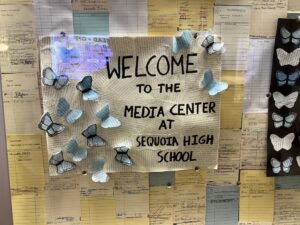
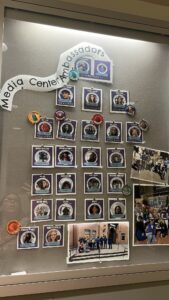
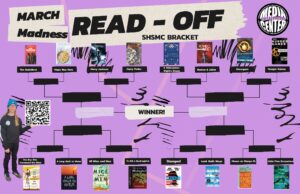
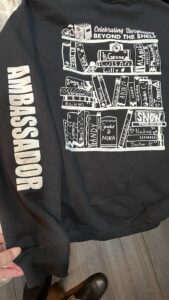
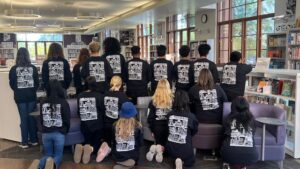
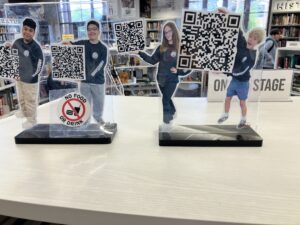 .
.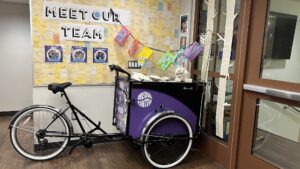
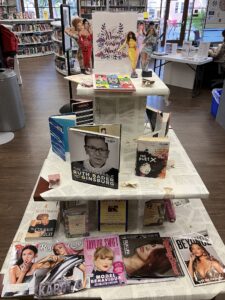
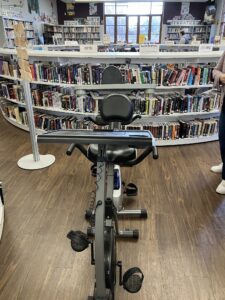
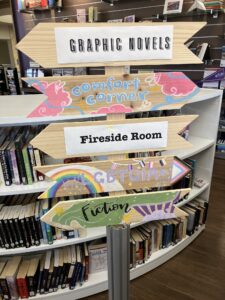
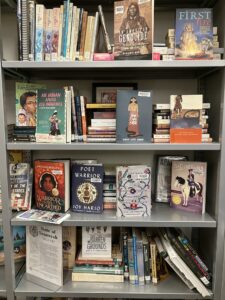
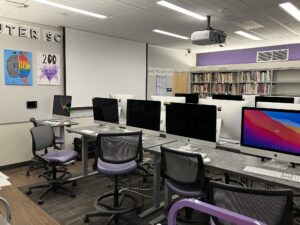
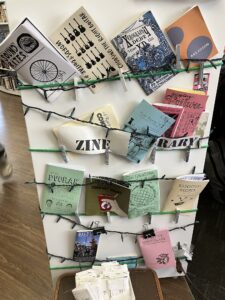
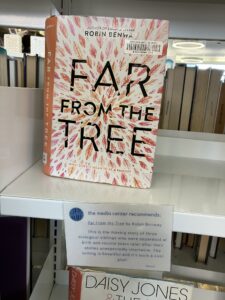
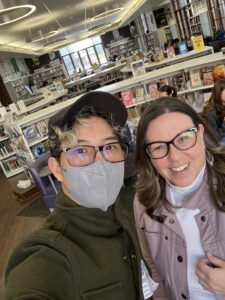
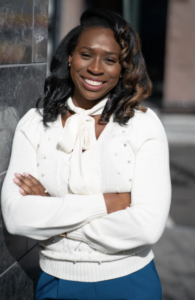
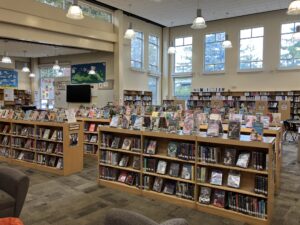 As part of this CPDWL blog series on visiting libraries, I wanted to highlight a middle school library visit (a library for students ages 11-13). Located in Palo Alto, California (USA), this middle school is called “
As part of this CPDWL blog series on visiting libraries, I wanted to highlight a middle school library visit (a library for students ages 11-13). Located in Palo Alto, California (USA), this middle school is called “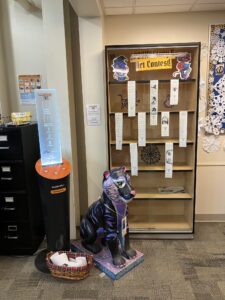
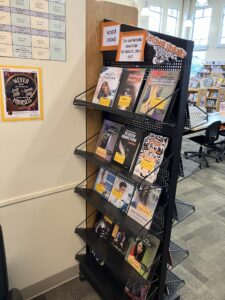
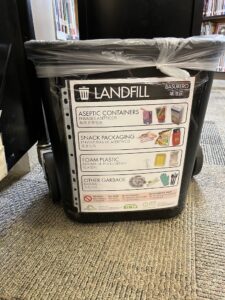
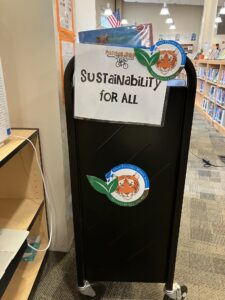
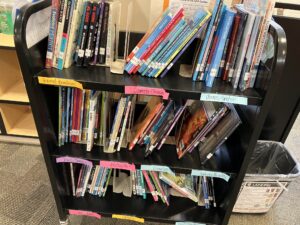
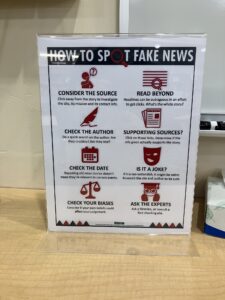 We also discussed collection development strategies and how they actively diversify the collection to reflect different voices and identities. I learned from Ms. Lee about how she as a teacher librarian, engages with the curriculum by collaborating with teachers on assignments such as an Ancient Egypt research project, having books ready on shelf on that topic. She was also ready to engage with students having to cite their sources. I also noticed the
We also discussed collection development strategies and how they actively diversify the collection to reflect different voices and identities. I learned from Ms. Lee about how she as a teacher librarian, engages with the curriculum by collaborating with teachers on assignments such as an Ancient Egypt research project, having books ready on shelf on that topic. She was also ready to engage with students having to cite their sources. I also noticed the 